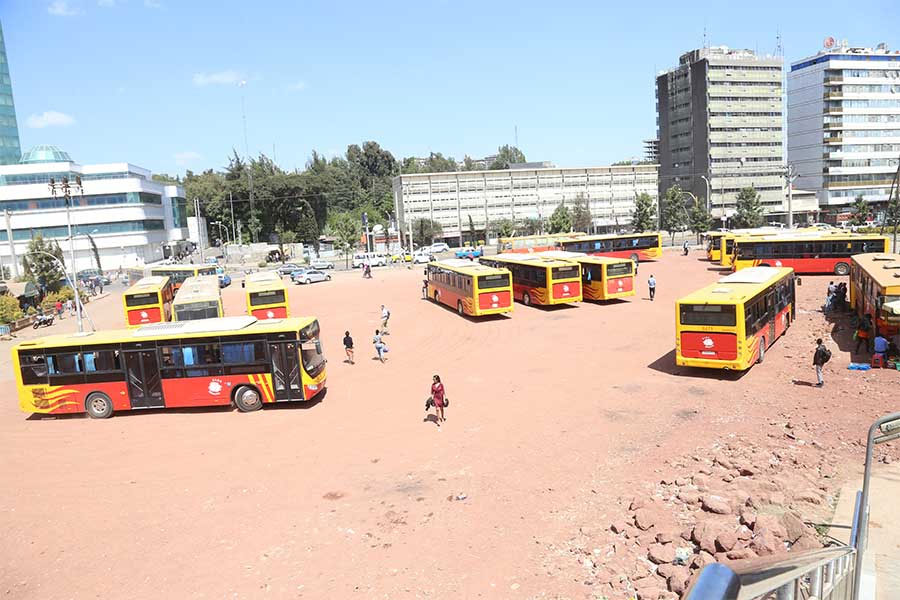
View From Arada | Feb 05,2022
Jul 20 , 2019
By Eden Sahle
Last week I was privileged enough to be invited to a high-level conference where academics, high ranking government officials from around the world and experts from different sectors were in attendance. It was a conference where I raised questions and learned so much from the experts, lessons I could not have access to any other way. Among the presenters was a high-ranking government official from Togo. The gentleman gave an inspiring presentation speaking about human rights, democracy and trade integration, all of which Africa is starving for.
He said without respect to human rights and democracy in the continent, we can never achieve free trade and development. Following this truthful statement, I asked him how he will implement this in his own country where the government he is serving is accused of gross human rights violations. To everyone's surprise, his answer to my question was that I should ask this question of the former Tanzanian president who was at the conference. He left the question unanswered, expecting the former Tanzanian president to speak on his behalf about Togo, the country he himself is serving in a high-ranking government position. We all laughed at the conference over his response, but this is no laughing matter.
Leaders in Africa are used to lying to our faces and getting away with crimes against humanity, injustice, corruption and bad governance. A good friend from Togo was denied all her rights and forced to leave her country, a country she loves and has sacrificed so much for. Her safety has been jeopardized, forcing her to jump from one country to the other, although it did not stop her from fighting for justice and free elections. Sadly, her crime is asking for respect for human rights, democracy and free elections on behalf of the Togolese people. I have professional friends from other countries who go through unimaginable viciousness, because they are on a mission to demand their rights in their own country.
Unfortunately, Africa is a continent where heads of state seek to become president or prime minister for life at any cost only serving their selfish interest. The fact that they are doing a bad job does not push them out of office. Rather, the more they stay in power, the more they are convinced that the country they are leading is their private company. Leaders in Africa believe that becoming a leader is inheriting a country with a free ticket to do whatever they please. Most of them do not have a clue that being a leader is being a servant of the public interest and working for the best interest of a country. African leaders have created a bad image of the continent around the globe by their poor governance skills, corrupt behaviour, brutality against their own people and lack of knowledge in leading the country they represent.
Even in the 21st century, the trend of incompetent leadership had spread across the continent. Corruption, instability, societal fracture and economic stagnation have become the identity of Africa. In these modern times, many African leaders still struggle to hand over power peacefully. They hang on with fraudulent elections that claim they received 99pc of the vote. Ethiopia is no exception to this.
While neglecting the public, embezzling government funds, brutally abusing and arbitrarily arresting civilians and knowing the public despises them, still these leaders want to hang on to power. This is a disgrace that we are forced to live with as Africans. Some leaders such as Yoweri Museveni of Uganda and Teodoro Obiang of Equatorial Guinea have been in power for more than three decades despite people’s resistance. Many others have died in office or have been removed after decades of struggle by the people.
What is heartbreaking is that there is an incredible correlation between Africa’s poor leadership and its developmental and security bottlenecks, including endless conflict, political and economic instability and declining economies.
This rich continent is trapped by dictatorship and misuse of power, unable to escape from chronic poverty with a continually struggling economy. Ignoring peoples’ call, leaders do not mind allowing ineffective public institutions to waste the country’s resources.
Leaders are not moved by their gross corruption, embezzlement and neglect of public infrastructure even when the public knows it and starts to fight it. They have managed to effectively disregard the law and the public outcry. In my travels on the continent, what is common to hear is war crimes and crimes against humanity committed by those in power. It is frightening that they get away with such actions.
I have met individuals who have been victims of arbitrary detention and rape. Their freedom is restricted, and they are intimidated until they are unable to live in their own country. All this because they demanded that their rights as humans and citizens of a country to be respected.
African leaders protect each other through reticent collisions, because they all find each other in the same position at some point in their leadership life. Had we had strong and persistent criticism and intervention from the African Union and international organizations to the brutality and human rights abuse and injustice in Africa, we would have witnessed a continent prospering and developing. We would have eradicated the massive challenges that plagued the continent step by step.
Simply put, it is leaders who are practically destroying African political, economic and social institutions, and thus forcing the population to flee. Leaders are not able to shift the African paradigm, because their focus is on staying in power and serving themselves and their party interests instead of their country and people.
It is puzzling how long the continent can go on with such poor governance. How long will Africans put up with the lack of inherent leadership values, lack of respect for law and democracy? When will leaders stop their cynicism and show respect for human rights and democratic values? When will constitutional democracy become the mission of leaders in the continent? As African citizens who aspire to a prosperous and democratic continent, we pray for the transformative leaders who will serve the interests of their people, who are skilled enough to help Africa thrive.
PUBLISHED ON
Jul 20,2019 [ VOL
20 , NO
1003]

View From Arada | Feb 05,2022

Sponsored Contents | Oct 24,2023

Sunday with Eden | May 25,2019

Viewpoints | Jul 20,2024

Commentaries | Jun 07,2025

Advertorials | Jul 08,2024

My Opinion | Apr 13,2024

Radar | Apr 19,2025

View From Arada | Apr 20,2025

Editorial | Feb 27,2021

My Opinion | 131983 Views | Aug 14,2021

My Opinion | 128372 Views | Aug 21,2021

My Opinion | 126309 Views | Sep 10,2021

My Opinion | 123927 Views | Aug 07,2021

Dec 22 , 2024 . By TIZITA SHEWAFERAW
Charged with transforming colossal state-owned enterprises into modern and competitiv...

Aug 18 , 2024 . By AKSAH ITALO
Although predictable Yonas Zerihun's job in the ride-hailing service is not immune to...

Jul 28 , 2024 . By TIZITA SHEWAFERAW
Unhabitual, perhaps too many, Samuel Gebreyohannes, 38, used to occasionally enjoy a couple of beers at breakfast. However, he recently swit...

Jul 13 , 2024 . By AKSAH ITALO
Investors who rely on tractors, trucks, and field vehicles for commuting, transporting commodities, and f...

Jul 5 , 2025
Six years ago, Ethiopia was the darling of international liberal commentators. A year...

Jun 28 , 2025
Meseret Damtie, the assertive auditor general, has never been shy about naming names...

Jun 21 , 2025
A well-worn adage says, “Budget is not destiny, but it is direction.” Examining t...

Jun 14 , 2025
Yet again, the Horn of Africa is bracing for trouble. A region already frayed by wars...

Jul 6 , 2025 . By BEZAWIT HULUAGER
The federal legislature gave Prime Minister Abiy Ahmed (PhD) what he wanted: a 1.9 tr...

Jul 6 , 2025 . By YITBAREK GETACHEW
In a city rising skyward at breakneck speed, a reckoning has arrived. Authorities in...

Jul 6 , 2025 . By NAHOM AYELE
A landmark directive from the Ministry of Finance signals a paradigm shift in the cou...

Jul 6 , 2025 . By NAHOM AYELE
Awash Bank has announced plans to establish a dedicated investment banking subsidiary...